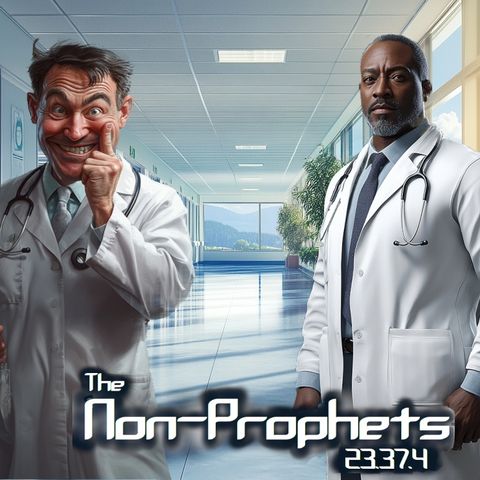Forget Credentials, Just Check Their Melanin

Descarga y escucha en cualquier lugar
Descarga tus episodios favoritos y disfrútalos, ¡dondequiera que estés! Regístrate o inicia sesión ahora para acceder a la escucha sin conexión.
Forget Credentials, Just Check Their Melanin
Esta transcripción es generada automáticamente. Ten en cuenta que no se garantiza una precisión absoluta.
Descripción
https://angrywhitemen.org/2024/08/23/joel-webbon-insists-its-not-racist-to-prefer-a-white-doctor-over-a-black-doctor/ Angry White Men, By , on August 23, 2024 https://angrywhitemen.org/2024/08/23/joel-webbon-insists-its-not-racist-to-prefer-a-white-doctor-over-a-black-doctor/ The idea that race could be a determining factor for medical competency is both misleading and absurd. The suggestion...
mostra másAngry White Men, By , on August 23, 2024
https://angrywhitemen.org/2024/08/23/joel-webbon-insists-its-not-racist-to-prefer-a-white-doctor-over-a-black-doctor/
The idea that race could be a determining factor for medical competency is both misleading and absurd. The suggestion that doctors of color might be given a "special pass" through diversity initiatives ignores the years of rigorous education, exams, and clinical training they must undergo, just like their white peers. This misguided belief perpetuates the notion that minority professionals are inherently less capable, as if their qualifications are somehow diluted by their race. The flawed logic goes further by implying that choosing a doctor based on skin color is more rational than selecting one based on actual medical credentials and expertise. This reductive thinking undermines the integrity of affirmative action, which aims to level the playing field, not lower the bar.
Moreover, this view dismisses the hard work and achievements of minority doctors who have earned their place in the medical field through sheer merit. Despite the uproar from certain groups who believe they are being left out, the reality is that affirmative action does not hand out "free passes." These doctors still have to meet the same rigorous standards as anyone else. The false perception that race alone grants unearned advantages only fuels resentment and division. In fact, it's a gross oversimplification to assume that affirmative action compromises quality; it simply ensures more equitable access to opportunities that were historically unavailable to minorities.
Furthermore, this kind of thinking is not just a misunderstanding—it's a form of modern-day racism, disguised as concern for fairness. The idea that a doctor’s competence is tied to their ethnicity rather than their abilities is not only offensive but dangerous. It promotes a distorted view that undermines public confidence in healthcare, especially in diverse communities. While it's understandable to want a doctor you're comfortable with, basing that comfort on race alone reflects deep-seated prejudice.
Interestingly, the same people who criticize affirmative action often overlook the systemic biases that have long favored white professionals. Historical exclusion from education and employment opportunities has left many minorities on the margins, and affirmative action seeks to correct this imbalance. To suggest that affirmative action is a handout is to ignore the very real barriers that have been erected against minority communities. The assumption that doctors of color are less qualified because of such policies is a harmful stereotype that reinforces racial hierarchies.
The double standard in these arguments becomes even more evident when people make exceptions for certain minority groups. Claiming that one might prefer an Asian doctor over a Black one, for example, exposes the inconsistency in their reasoning. It's not about qualifications; it's about deep-rooted biases. This selective reasoning underscores how racism persists under the guise of personal preference or rational decision-making.
The broader issue is how racism gets redefined to fit the narrative of those who don't want to see themselves as racist. They argue that their concerns aren't about race, but about quality. Yet, when race is the sole factor in deciding a professional’s competence, the discrimination becomes clear. Even worse, some may try to justify this by claiming that racism isn't condemned in the Bible, which further highlights how deeply embedded these biases can be in both cultural and religious institutions.
At the heart of this debate is the need for systemic change. Racism in healthcare, education, and employment is not new, and efforts to combat it through policies like affirmative action are crucial. However, those policies alone cannot change hearts and minds. It requires an honest acknowledgment of the biases that still pervade these systems and a commitment to treating people as individuals, not as representatives of their race.
The Non-Prophets, Episode 23.37.4 featuring Infidel 64, AJ, Damien H and Aaron Jensen
Información
| Autor | Atheist Community of Austin |
| Organización | Atheist Community of Austin |
| Página web | - |
| Etiquetas |
Copyright 2024 - Spreaker Inc. an iHeartMedia Company
